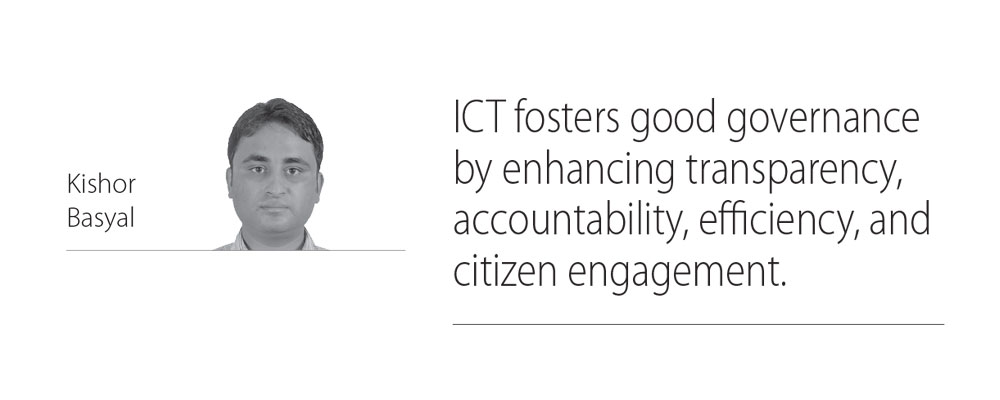- Wednesday, 17 December 2025
ICT Vital For Achieving Prosperity
ICT (Information and Communication Technology) refers to the broad range of technologies used to manage and communicate information. This includes computers, software, networks, telecommunications, and other electronic devices and systems that enables users to store, retrieve, transmit, and manipulate data. ICT has become so seamlessly integrated into our lives that it has profoundly influenced education, business, healthcare, and governance. As it gets increasingly embedded into all aspects of life, its importance is poised to grow even more, fueling innovations that shape the future of society. The seventh National ICT Day 2024 is being marked today with the theme “ICT – the foundation of prosperous Nepal”. This article seeks to examine various sectors revolutionised by this technology as well as how it has laid the foundation of prosperity for a modern society.
First is education. Because it democratises knowledge and empowers individuals with data that was previously difficult to obtain, ICT makes vast amounts of information accessible to anyone with internet access. It enhances educational methodologies, enabling interactive learning, access to wealth of online resources, and distance education opportunities. What’s more, ICT enhances access to education and training, empowering individuals with the skills needed for employment in the digital economy. This leads to a more skilled and adaptable workforce, which is essential for economic prosperity. When the pandemic shut schools, depriving pupils of education, it is through ICT tools they were able to create school-like virtual environment to engage students in academic activities.
Productivity
Second is productivity. It is the measure of the output delivered by a worker in an hour. Productivity is closely related to prosperity. That's because the amount of output an employee delivers determines what sum of money s/he is paid for it. So it's natural for wages to be higher in highly productive countries. ICT enhances productivity in several ways, transforming how businesses, governments, and individuals operate. One way it does this is through automation, which reduces the time and manpower needed for routine tasks, freeing up human resources to focus on strategic tasks that is more rewarding and also value adding. It also supports the development of digital literacy skills critical in today’s job market. ICT enables remote work, allowing employees to work from anywhere, which can increase productivity by reducing commute time and providing flexibility.
Third is healthcare. ICT’s miraculous ability became evident when COVID-19 upended every sector of our social life, forcing us to stay indoor in isolation and disrupting all spheres of day-to-day normal life. When visiting a hospital was seen as too risky, doctors used ICT tools to communicate with their patients, so the patients could stay healthy or pull through illnesses. Such tools can improve treatment outcomes, facilitate remote care, and enhance research capabilities with big data analytics, such as machine learning. In addition, emerging tools like Artificial Intelligence (AI) are already aiding health professionals in discovering cancerous cells, moles and other hazards in human body before they can take their toll. AI-powered tools have now become indispensable in discovering drugs for hard-to-cure diseases, bringing their treatment within reach.
Fourth is governance. ICT fosters innovation and entrepreneurship by removing barriers, providing access to information and resources, and fostering collaboration and networking among innovators and entrepreneurs. ICT enables governments to deliver more efficient and transparent public services, enhance citizen engagement, and improve governance processes, which can contribute to overall prosperity and development. The Nepal government has done much to expand the use and scope of ICT. Now every government-provided service, from making property-related transactions to obtaining driving license to filing taxes, has gone online, requiring all service seekers to compulsorily use ICT.
Even many government hospitals are increasingly allowing patients to making appointments for the doctors of their choice at the time convenient to them, among many other innovative measures. Not only has this obviated the need to unnecessarily wait in queues, service delivery has also become effective and efficient. And these are extraordinary feats given their far-reaching implications. ICT systems streamline government processes, reducing bureaucratic delays and inefficiencies. Digital platforms for administrative tasks, like online forms and electronic document management systems, improve workflow efficiency. ICT provides platforms for citizens to have a say in the government decisions through online forums or social media. This engagement allows citizens to voice their opinion, contribute ideas, and provide valuable feedback, which can be leveraged to better the services.
Good governance
ICT facilitates the delivery of government services electronically, making them more accessible and convenient for citizens. ICT tools like government websites, mobile apps, and digital newsletters improve communication between government agencies and citizens, ensuring timely and relevant information dissemination. ICT fosters good governance by enhancing transparency, accountability, efficiency, and citizen engagement. It can also help track and monitor government actions and spending, making it easier to hold public officials accountable for their decisions and actions, and building trust between governments and their people. Overall, ICT empowers governments to operate more efficiently, transparently, and responsibly, leading to better governance outcomes and citizen satisfaction.
Fifth is innovation. When we think of innovation, companies like Tesla, Googleand Microsoft, Apple, among many others, come to mind. What makes them so powerful and wealthy? The answer is innovation. Innovation adds value to a company, which is why their bosses and owners are crazy rich. These days more and more companies are ditching tradition in favour of innovation. Today, most powerful economies are those that are constantly innovating.
ICT enables innovative businesses to streamline operations, reach new markets, and create new products and services with reduced cost, paving the path towards prosperity.
(Basyal works as a journalist at The Rising Nepal)
















